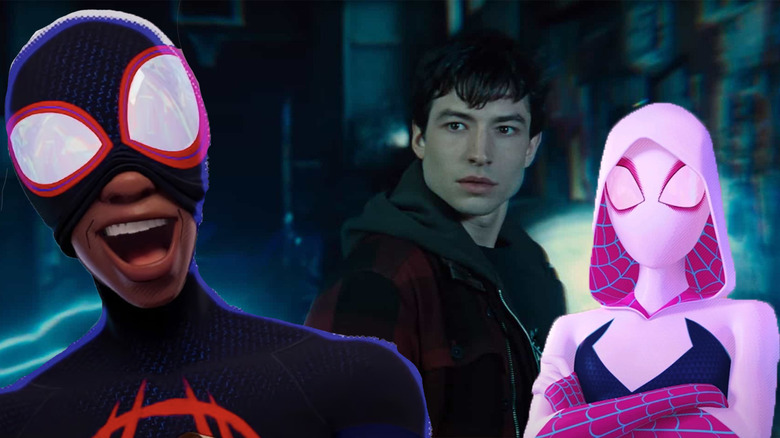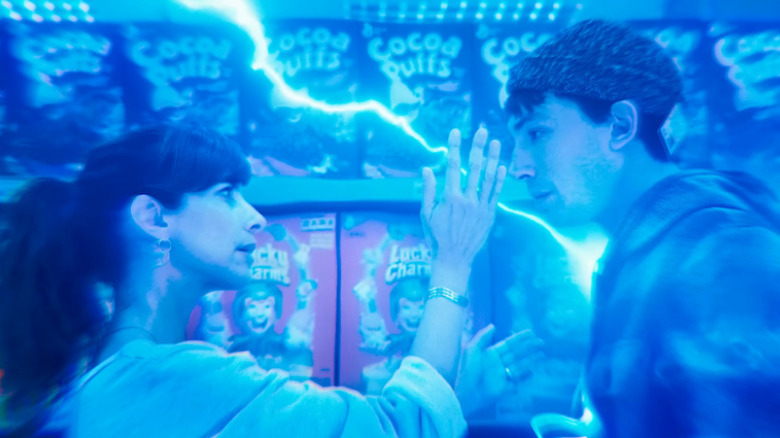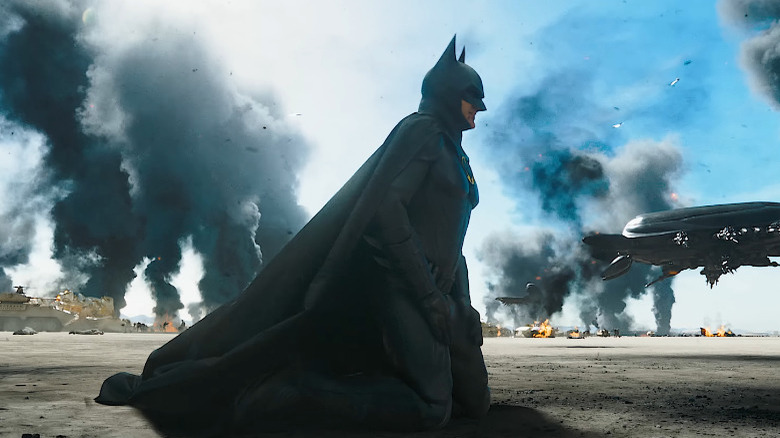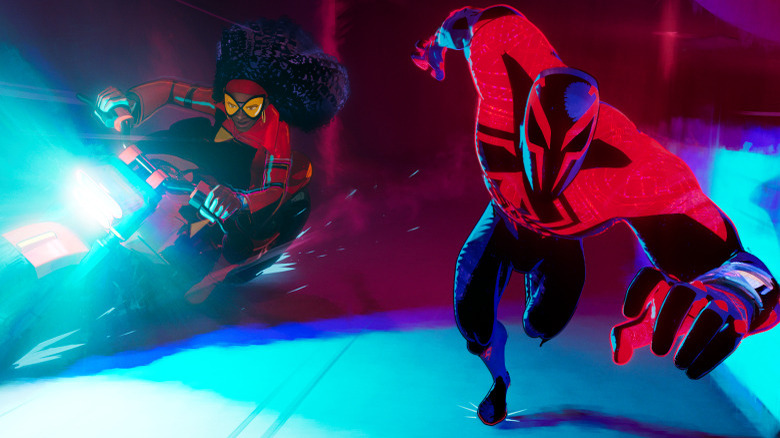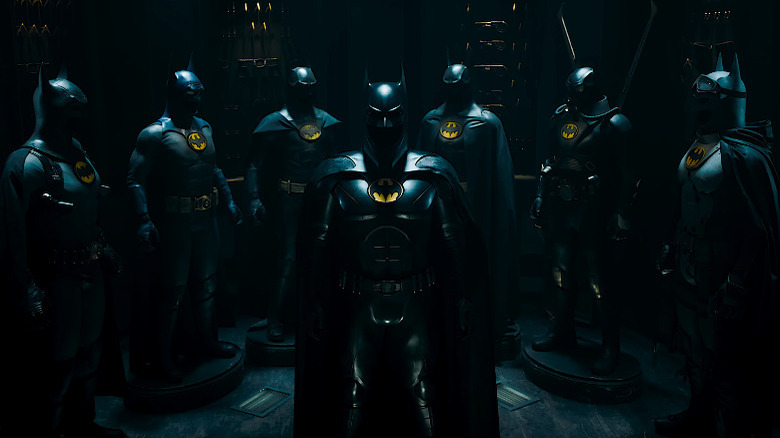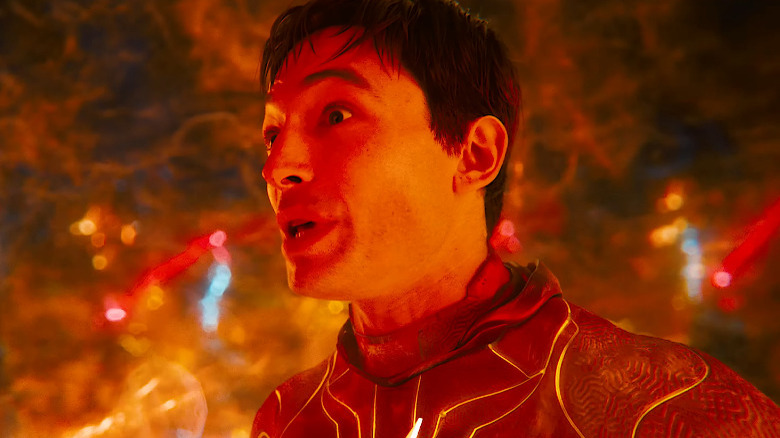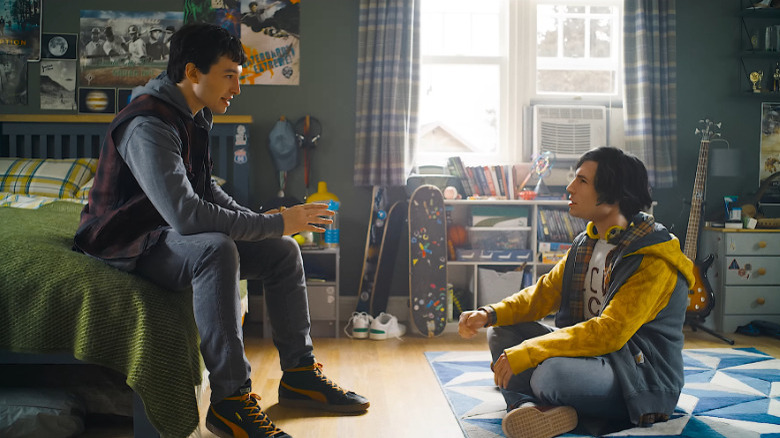Sorry, The Flash: Spider-Man: Across The Spider-Verse Already Ate Your Multiverse Lunch
This article contains massive spoilers for "The Flash" and "Spider-Man: Across the Spider-Verse."
One of the longstanding ironies of The Flash is that, even though this superhero can travel fast enough to go back in time, he always ends up late to everything. In the comics, movies, and TV shows The Flash is usually late for work or social functions because he has to constantly save the world, but sadly, this tardiness is true in the film industry too.
Andy Muschietti's film "The Flash" has been in development for a decade, at least in its current form, and it's been delayed over and over and over again for reasons that range from the conventional — i.e. the usual development hell shenanigans of hiring and replacing multiple filmmakers — to the unforeseen, like the gradual dissolution of the so-called "DC Extended Universe" movie franchise, the allegations of abuse at the hands of star Ezra Miller, or the COVID-19 pandemic that put just about everything in the world on hold at once.
"The Flash" is, by any reasonable measure, simply late to this party. A whole live-action "The Flash" TV series has come and gone while the film was stuck in development, inviting endless comparisons. That certainly doesn't help. And what's worse, the film's basic premise — introducing the concept of the multiverse to the DCEU — isn't the novelty it would have been just a few years ago.
It's entirely possible that, if "The Flash" had come out on time, exactly the way it is now, it would be an interesting and exciting motion picture. But coming out now, after multiple multiverse films and especially hot on the heels of "Spider-Man: Across the Spider-Verse," it's simply too little, too late.
The ripples: all you need is Flash
The plot of "The Flash" finds Barry Allen (Ezra Miller) traveling back in time to prevent the murder of his mother, Nora Allen (Maribel Verdú), and to prevent his father, Henry (Ron Livingston), from going to prison for a crime he didn't commit.
Despite warnings from Batman (Ben Affleck) that changing even the tiniest part of the time stream could destroy all of reality, Barry decides to do it anyway, and winds up trapped in an alternate reality with only one superhero, Batman (Michael Keaton), who is defenseless against the invading forces of General Zod (Michael Shannon) from "Man of Steel."
Theoretically, this is all supposed to be incredibly entertaining. Hey, look, the old Batman is back! And look, there are two versions of The Flash! Plus there's an alternate reality version of Supergirl, played by Sasha Calle! How will they stop General Zod all by themselves, when previously all it took was just one Superman?
Actually, it probably shouldn't be all that difficult if you think about it like that. Anyway, moving on, I suppose.
But there's a difference between doing a thing and doing it well, and while "The Flash" undeniably does the multiverse fan service thing where we meet multiple versions of characters, it half-asses the job. Or at least it looks that way, now that we know what using a whole ass looks like.
Bat '90s show
What "The Flash" fails to understand about multiverse stories is that simply throwing some fan service at us isn't interesting in and of itself. It's one thing to see an alternate version of Batman, but it's another to have that Batman do something other than provide exposition about time travel and beat up some random goons we have no reason to care about.
Let's take a look at how "The Flash" tackles Batman. We meet him in a squalid version of Wayne Manor, having presumably let the place go after his butler died (although that's never made explicit). He beats them up in a kitchen, then makes pasta and explains time travel and the multiverse — never mind how he'd know how that works — and then he gets to fight some people, and then (I warned you about spoilers) ... he dies.
And he doesn't just die, he dies over and over again, countless times. It turns out that the version of Batman we grew to love in the 1980s and 1990s is inextricably destined to die failing to save the human race from extinction. So not only do we not get to find out what happened to him, other than a vague implication that he became a bad housekeeper, but we also find out that the whole Burton-verse was pretty much doomed. Everything we cared about was for naught.
Um, thanks "The Flash," but that's not adding something to the canon of these various characters. It's taking something away. Where "Spider-Man: No Way Home" revisited other Spider-Men and gave their stories new and satisfying conclusions, "The Flash" revisited Batman and gave him a new ending that kinda stinks.
A Space Jam in the crowd
What the two "Spider-Verse" movies do, and what the other great multiverse movies "Spider-Man: No Way Home" and "Everything Everywhere All At Once" do, is tell stories about how the infinite possibilities of time and space have meaning. Every version of the protagonist is treated like an equally valid and interesting person, and all of them get some time to shine.
"Across the Spider-Verse" doesn't just have style and energy to spare — with brilliant animation and a witty and soulful screenplay — it also gives audiences an opportunity to not just see alternate versions of characters, but give them respect and pathos. Characters like Gwen Stacy and Miguel O'Hara have rich, complex lives and emotions. Even brief appearances from alternate Spider-People, like Sun-Spider or Peter Parkedcar: The Spectacular Spider-Mobile, at least have hero moments.
It's not just that a bunch of superhero characters the studio has the rights to are in the same place at the same time. Don't believe me? Just watch the third act of "Space Jam: A New Legacy" to find out how thrilling it is to watch the Droogs from "A Clockwork Orange" and the orgy nuns from "The Devils" just mill about in the background with the Flintstones to see how little impact that makes.
"Across the Spider-Verse" presented the audience with infinite possibilities and then actually showed us those possibilities. Whereas "The Flash" offers infinite possibilities and then screws around in just one reality, gives two team-ups against armies of faceless toadies, and then ends in a shallow clip show.
Are you being fan-served?
The actual conclusion of "The Flash" — how many times have I warned you about SPOILERS — finds two versions of the Flash trapped in a nexus of realities, where they see many different renditions of Superman, as played (or as awkwardly rendered by CGI) by George Reeves, Christopher Reeve, Henry Cavill, and Nicolas Cage, an actor who was supposed to play Superman in the 1990s for Tim Burton before the production collapsed.
Just catching a glimpse of these characters is supposed to inspire wonder, and maybe it would have if this was the first time a movie had done such a thing, but it falls extremely flat. We don't see most of these characters do anything, or interact, or share their experiences and woes. And we only see a very small handful of Supermen anyway. Whither goeth Brandon Routh, Kirk Alyn, or any of the other TV versions besides George Reeves?
You could argue that those versions of Superman are obscure, but the "Spider-Verse" movies have already argued that obscurity means nothing, and all versions of every character are valid. And the argument was incredibly convincing, so seeing just a handful of the infinite possibilities, mostly staring at the screen and doing nothing, is extremely uninspiring, and frankly very dull.
And the one character we do spend time with mostly spouts exposition, reuses old catchphrases, and essentially dies a failure. Whee? Are we supposed to go "Whee?"
A sound of blunder
"The Flash" and "Spider-Man: Across the Spider-Verse" actually do have quite a bit in common. They both find their heroes in an impossible position where they are expected to let a loved one die when they can prevent it for the sake of the multiverse at large, and they both end with revelations that could have giant ramifications as the story moves forward.
The difference is that "Across the Spider-Verse" ends with a definite cliffhanger and a promise that the next movie — which is already in production — will (at least hopefully) tie up the loose ends. "The Flash" ends with Barry resolving the storyline about his parents but realizing he's still broken reality, and that there may be larger ramifications he doesn't know about yet.
"The Flash" simply ends here, and without a definite sequel on the horizon, and with the fate of the DCEU extremely unclear, it fails to offer any sense of meaningful resolution on any level. What are the rules now? Is that guy really Batman now? Is everyone different except Barry and Aquaman? And come to think of it, if this isn't the reality Barry left in the first place, doesn't that mean there's still another Barry out there somewhere?
The whole film has about as much of a conclusion as the "Treehouse of Horror" episode where Homer Simpson goes back in time and keeps creating alternate timelines. In the end, he finds a timeline that's not quite right — everyone in his family has lizard tongues — but decides that it's close enough and stops trying.
It's hard to be satisfied by a movie that ultimately throws up its hands and says, "Whatever, a whole bunch of stuff is different now but we're going to be very vague about it and let future films establish the new rules."
Multiverse of meh-ness
"The Flash" has the misfortune of opening just a couple of weeks after "Spider-Man: Across the Spider-Verse." It also has the misfortune of opening after "Everything Everywhere All At Once" and "Spider-Man: No Way Home," which also took multiverse concepts and — ironically, unlike "The Flash" — actually ran with them.
But the closest parallel is probably "Doctor Strange and the Multiverse of Madness," which also promised an exciting trip through alternate realities but spent most of the time exploring just one of them, and unceremoniously killed the most exciting characters. It also ended with — spoilers, seriously, come on now — the hero fighting an evil version of himself, as well as a hero-turned-villain who runs amok in the multiverse for selfish reasons, ruining countless lives.
Both films feel like flimsy excuses for underwhelming fan service, introducing characters and ideas with huge potential, and then doing as little as possible with them. And while both films have some entertainment value they can't help but feel like time-wasters, an excuse to pull some toys out of the sandbox, show them to the audience, put most of them back unplayed with, and pop the heads off the ones that do make it out of the box.
An entire multiverse was introduced, and it's a multiverse with fewer possibilities than we could have anticipated. Only a few versions of the characters we love seem to have made the cut, and even fewer get to actually shine. If "The Flash" had come out when it was supposed to come out, maybe this would have been enough. The novelty would have won the day, and a path could have been set for future films to improve upon the formula.
But it didn't. It came out now, after other movies have done the same thing, and better. Our standards have been collectively raised, and "The Flash" can't quite reach them.
